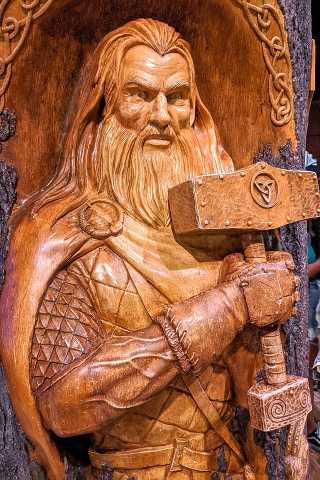I’ve almost finished reading Revolutionary Characters, by historian Gordon S. Wood, and have recently read biographies on George Washington and Benjamin Franklin. I intend to squeeze in Thomas Jefferson, John Adams, and Alexander Hamilton as soon as I can acquire the books, and I’ll look up the others on the internet. I look especially for information on their religious views and, so far, I have found nothing to indicate that the founding fathers were the devout men that Christian apologists and evangelicals would have us believe. Most of the Founders were deists, the prevailing sentiment held by the educated upper classes of the time, and they held in varying degrees of indifference and contempt the evangelical Christianity of the masses.
The religious right in this modern age like to point to references to God in the founders’ letters and documents as proof of the religiosity of the framers of the Constitution, but the God of the deists bore no resemblance to the angry meddling God whose words contemporary evangelist would have inscribed on every surface of every federal facility on the planet and taught as science in the classrooms of our public schools. Appeals to God in those letters and documents were appeals to Providence, not to some denominational creator who heaps beneficence on the faithful and severe judgment on those not obedient to His authority as expressed by one or another interpretive branch of His dictates.
George Washington, ever aware of his public image, attended church to display his affinity with his constituency in much the same way modern politicians, steeped in corruption and self-interest, cater to a religious constituency to appear as one of the people. Alexander Hamilton used Christianity to achieve political ends and did not express adherence to the faith until the early nineteenth century, decades after his prominence in Revolutionary politics. John Adams openly expressed in belief in deism but thought church attendance essential to man’s morality. Thomas Paine’s masterpiece, The Age of Reason, promoted deism and criticized Christian doctrine. Benjamin Franklin considered himself a deeply religious man, but in his writings, he often refers to “the deity” and “providence,” without mention of Christianity. He endeavored to virtue, but of course, virtue does not rely on religion for its practice or existence. James Madison rigorously defended and promoted religious freedom. Of the founding fathers, only John Jay and Patrick Henry attested to orthodox Christianity. They did not belong to the class of educated men who adhered to the prevailing theology of deism among the landed elite in the northern colonies. Evangelical Christianity was, to those who aspired to a republican aristocracy in the Age of Enlightenment, the religion of the unenlightened masses.
The furor over the place of religion in patriotism began with Francis Scott Key’s words in the Star-Spangled Banner: “And this be our motto: In God is our trust.” We can assume without further research that the god referred to is the Judeo-Christian deity.
Proselytizers and enforcers of religious have only the motto “In God We Trust” as a wedge and as justification for their attempts to force fundamentalist Christianity on an entire nation, but that graffiti did not appear on American currency until the Civil War's religious revival period, at a time of religious revival in the United States and was not adopted as the national motto until the Eisenhower administration in 1956, when the aristocratic values inherent in the Age of Enlightenment ceased to have relevance. Its acceptance as the national motto was accelerated when positioned as a response to “Godless Communism”.
The most militant atheist quarrels with inscriptions of the national motto on currency and the Ten Commandments on the face of federal buildings, but most Americans view those allusions to religion with ambivalence. The motto refers only to “God” and does not promote the god of a favored group, and the Decalogue represents a historical event and is not the sole province of any particular philosophy. The exact wording belongs to the Judeo-Muslim-Christian heritage, but identical admonitions come from multiple cultures and religions ranging from the code of Hammurabi to definitions of proper behavior in Scientology. It does not require religious thought to know that rules set forward in the Commandments represent common-sense applications for an individual to live by if he is to live at peace in a society. The problem many deists have with religious graffiti on taxpayer-funded property lies in the rigid enforcement by brown-shirt religious leaders to limit those inscriptions to their particular faith. Why not include Buddhism’s Eightfold Path, and the Sutras of Patanjali? Buddhism and Hinduism, are, after all, well represented in American society, as are Wicca, Paganism, Scientology, and any number of groups and doctrines that have sprung up to challenge the rigid and chauvinist dogma of Christianity and its history of torture, mass murder, and denial of reason and free thought to enforce its adherence.
#
.png)


